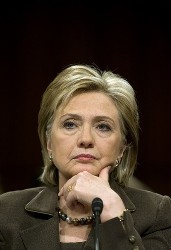US Secretary of State nominee reiterates Darfur agenda
January 13, 2009 (WASHINGTON) — Senator Hillary Clinton, appearing before the Senate Foreign Relations Committee seeking to be confirmed as Secretary of State, called ending “human devastation in Darfur” a foreign policy objective of the Obama administration.

She argued that “these institutions, when they work well, enhance our influence. And when they don’t work well – as in the cases of Darfur and the farce of Sudan’s election to the former UN Commission on Human Rights, for example – we should work with likeminded friends to make sure that these institutions reflect the values that motivated their creation in the first place.”
A group of about 15 student activists from local chapters of the national anti-genocide advocacy group STAND gathered outside the Russell Senate Office Building seeking to remind Clinton of the promises she had previously made on Darfur. The activists are expected to send another group to the confirmation hearing of Susan Rice, the nominee for U.S. Ambassador to the United Nations.
Clinton somewhat sidestepped a question from Senator Russ Feingold in which he asked her to assess the viability military and other options, which he named as “expanding sanctions, imposing a no-fly zone over Sudan, bombing aircraft, airfields and perhaps even the regime’s military and intelligence assets.”
The nominee responded, “Senator, again, this is an area of great concern to me, as it is to the president-elect. We are putting together the options that we think are available and workable. It is done in conjunction, as you would assume, with the Department of Defense.”
She later added, “we intend to bring along as many people as we can to fulfill the mission of the U.N.-A.U. force, which is not yet up to speed and fully deployed, as a very first measure. That’s a preexisting policy we agree with.” Accelerating deployment of the joint UN-African Union peacekeeping operation has been the main approach of the Bush administration over the last year.
“We are going to work to try to effectuate it,” said Clinton, adding, “and then, as you rightly point out, the president-elect, the vice president-elect, I and others have spoken about other options, no fly zones, other sanctions and sanctuaries, looking to deploy the U.N.-A.U. force to try to protect the refugees, but also to repel the militias.”
“So there is a lot that is under consideration and I know of your interest in this, along with other colleagues, and we will keep you advised as we move forward,” she concluded.
Clinton represents one of the more politically powerful Secretaries of State chosen in recent decades of American history, which could allow her to put considerable political impetus behind whatever decisions she might take. Yet it is still unclear how the incoming Obama leadership team will address Sudan policy, especially given the unpredictable situation in Sudan and potentially conflicting priorities within the administration.
While some observers, including members of Sudan’s government, have expressed concern about the new U.S. administration’s intentions, others are skeptical that the threats are anything more than rhetoric designed to placate domestic agitators.
According to Edward Thomas, author of “Against the Gathering Storm: Securing Sudan’s Comprehensive Peace Agreement,” a report released Friday, the U.S. finding of genocide in Darfur, combined with Sudan’s “intransigent response, have led to an implied, and non-credible, set of regime change threats from US officials, supported by US domestic constituencies.”
Thomas notes, “At the same time, US experiments in regime change in other countries have led many of its officials to reject the policy – there is a drift towards accommodating rather than destroying ‘Arab’ elites. The security men at the top of the NCP have cooperated closely with the US and its allies on counter-terrorism: one newspaper report in 2006 even claimed that NCP agents in the Islamist insurgency in Iraq were providing the US with information.”
“The use of allies by both the NCP and the US to pursue strategies of public mutual denunciation may even be of help in this trade in information,” he suggested.
Yet there are signs that the potential for escalation is real. According to a memo leaked to the New York Times in December, military options reached President Bush’s desk again this fall.
“We will lead with diplomacy because it’s the smart approach. But we also know that military force will sometimes be necessary, and we will rely on it to protect our people and our interests when and where needed, as a last resort,” said Clinton today.
(ST)
